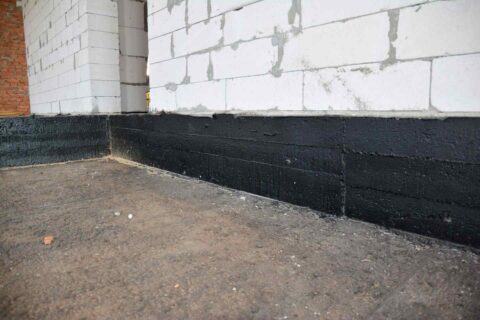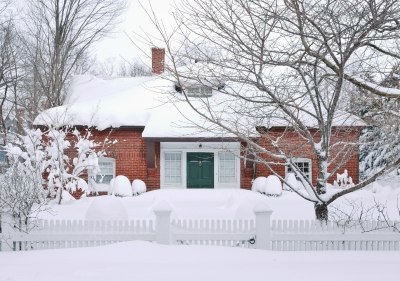Wintering Your Home
Steps to Successfully Winterize Your Home
Winter is on the way. Are you prepared? Getting ready for colder temperatures is about more than unpacking your sweaters and making sure your heater turns on. If you want to keep your family comfortable and protect the investment you have in your home, it pays to winterize your whole house. There are several steps you can take to make sure your home is ready for whatever winter brings.
Some Things You Can Do on Your Own, for Free or Practically Free
- Inspect the foundation. Walk around the outside of the house, checking to make sure the ground next to your home slopes away from the foundation. If you don’t have at least a 2-inch drop for each foot you move away from the house, add dirt against the foundation until the slope is correct. Keep plants and shrubs at least 12 inches from the foundation, and on a slope that pulls water away from the house.
- Clean your gutters. Remove all leaves, pine needles, and debris, so that water can flow freely down the gutters. Make sure the downspouts release that water at least 5 feet from the foundation, and away from sidewalks, where the water could freeze into icy patches in the winter. Keeping your gutters clear will also keep icicles from forming. You should also make sure there are no overhanging or dead branches over your roof, and clear the roof of any debris.
- Check your home’s exterior. Look for loose boards, securing if necessary. If there are any gaps or crack along your trim, seal them with exterior-grade caulk. Use spray foam to fill in the space between the foundation and the siding.
- Change your filters. Replace the old filter in your furnace with a fresh one. Check on other filters too, like the ones in your dryer and kitchen vent. While you’re at it, clear the lint from the outside dryer vent and vacuum your HVAC return vent covers.
- Switch your fan direction. When your ceiling fans move in a clockwise direction, they’ll push hot air from the ceiling to the floor. If you have an attic fan, reverse it from its warm weather position, so that it will pull warm air up instead of pushing cool air down.
- Change your batteries. Now is a great time to switch out the batteries in your smoke alarms and carbon monoxide detectors.
- Protect your pipes from freezing. Drain your outdoor hoses and disconnect them, making sure the faucets are turned off.
Other things require a little more effort and money but aren’t too expensive
- Have an energy audit. Utility companies often offer home energy audits to their customers, sending out an inspector to give your house a thorough once-over. The inspector will check the HVAC system for efficiency, safety, and leaks, inspect your attic and wall insulation, and assess the condition of your water heater and pipes. Home repairs may be suggested to improve your energy efficiency. Remember- many of these repairs will be tax-deductible.
- Seal all leaks around doors and windows. Replace worn-out weather stripping and caulk any gaps around windows and doors. Install gaskets around doors and sweep strips on the bottoms of doors. Some homeowners take it a step further, installing plastic film window insulation as well.
- Install a programmable thermostat. A programmable thermostat saves homeowners, on average, 6-12 percent on energy bills. Further, according to the toe U.S. Department of Energy, you can save an estimated three percent on your energy bill for every degree you lower your thermostat in winter.
Proper maintenance is the key to avoiding big heating bills mid-winter
- Have an annual maintenance check of your heating system. Each year, before the temperatures drop, schedule a professional checkup, cleaning, and maintenance for your HVAC and air ducts. Preventive maintenance will help you catch small issues before they become expensive problems that leave you stuck in the cold waiting on a repair.
- Have someone look at your chimney. Before you light your first fire of the season, have the chimney professionally cleaned and inspected. Consider a chimney balloon, which seals your chimney between uses and prevents drafts.
Winterize your attic and basement
- Keep your attic insulated. If your ceiling joists are visible in your attic, you need more insulation. Make sure your attic is properly ventilated and there is no blockage of the vents from things like wasp nests, leaves, and debris. Cover the hole where your attic stairs lower into the house. If you have attic windows, insulate them, and seal any ductwork.
- Pay special attention to your basement. Cover any exposed pipe with foam insulation. Inspect basement windows for leaks, and hire a professional basement waterproofing company to repair windows and seal any cracks in the wall, especially cracks that go all the way through concrete walls. The basement is often a home’s weak spot, and this is especially true in winter when cold air settles in the basement and storms raise the risk of flooding. Drafts in the basement will cause the heating equipment throughout the entire house to have to work harder than necessary, so make sure there’s no place for cold air to seep in.
When you need help preparing your basement to weather the winter, Budget Waterproofing is here to help. We’ve got more than 55 years of experience servicing both commercial and residential customers throughout Maryland. We’re proud of our craftsmanship and confident in our skills, and all of our technicians are fully licensed and insured. Whether you need basement waterproofing, a drainage system, crawl space waterproofing, or egress window installation, we’ve got you covered, with the experience and skills necessary to improve your basement and protect your family. For more information, contact us today.


